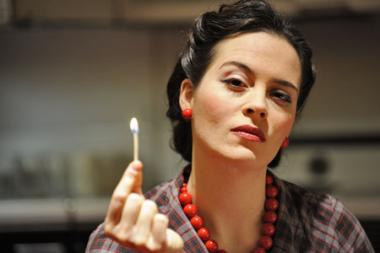Two crime stories take the stage next week at area colleges. Both are new works by student playwrights who are interested in the nature of guilt and the mechanisms of deceit.
Neither play is a whodunit; one is not even a whydunit. One looks back to the early 1960s, a time of “rapidly mounting tensions in American society.” The other looks at a near future when online gaming and social networking are rationed and regulated by faceless government watchdogs.
Amherst College senior Diandra Partridge took her inspiration for The Electric Version from Harlan Ellison’s classic sci-fi story “‘Repent, Harlequin!’ Said the Ticktockman,” about a society where wasting time is a punishable offense, and from “hearing my friends complain about all the time they spent on Facebook during final exams week.” Where Ellison’s time-squandering criminals are penalized by having equivalent minutes “revoked” from their lifespans, in Partridge’s version a person’s “unproductive” activities, thoughts and relationships—in effect, their identities—are expunged from their memories via a kind of cybernetic lobotomy.
Partridge’s Harlequin character is Harley Quinn (played by Kyle Boatwright), a young woman imprisoned for being “an accessory to time wasting” by facilitating illegal Internet access for people who have maxed out the personal Time Clocks that control their online hours. Like her namesake, the anarchic trickster from Commedia dell’Arte, Harley is a whimsical rebel, a sassy subversive with a sense of the ridiculous that’s as finely tuned as her moral outrage at a system that diminishes human independence.
The playwright says two questions guided her writing: “Why does the thought of being brainwashed—of being forced into a mindset that isn’t your own—frighten people so much? And there’s also the question of what we, as humans, ‘give up’ with each new technological advancement. Do we lose a part of some shared human identity with each new machine we integrate into our lives?”
Darren Harned, an MFA candidate in the Smith College playwriting program, says he wrote Some Mother’s Son because “I love crime fiction and I wanted to tell one of those sorts of stories, but from a woman’s point of view.” Though it’s not specified in the script, he set it precisely in 1963—on the cusp of history just before the Beatles and Vietnam—because in that era the woman’s vantage point “would have been limited and oblique, as most women were stuck in their homes.” Much of the play’s dialogue has the feel of TV shows of the period, from Perry Mason to Alfred Hitchcock Presents.
The point of view is that of Masha Kvichak (Susanna Apgar), an unhappily married Midwestern housewife whose teenage son appears to have murdered his best friend. Her maternal impulse leads her to destroy incriminating evidence and ultimately to violence. She is, the playwright says, “a mother trying to protect their way of life for her son’s sake, while that way of life may be the root of their problems.” The cast also includes Masha’s husband, her lover, her potential nemesis and two cops—but not her son the suspect, whom we see only through his mother’s reckless devotion.”
The Electric Version: Feb. 24-26, 8 p.m., free, Holden Theater, Amherst College, reservations recommended, (413) 542-2277.
Some Mother’s Son: Feb. 24-26 and March 2-5, 8 p.m., Hallie Flanagan Studio Theatre, Mendenhall Center, Smith College, Northampton, www.smith.edu/smitharts, (413) 585-ARTS (2787).



